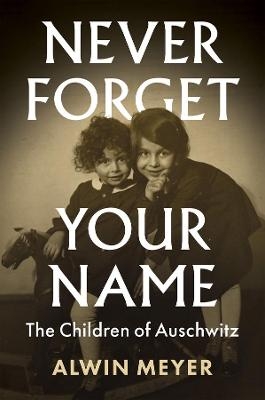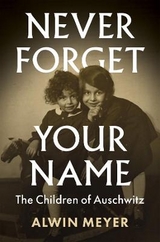Never Forget Your Name
The Children of Auschwitz
Seiten
The children of Auschwitz: this is the darkest spot in the ocean of suffering that was the Holocaust. They were deported to the concentration camp with their families, with most being murdered in the gas chambers upon their arrival, or were born there under unimaginable circumstances. While 232,000 children and juveniles were deported to Auschwitz, only 750 were liberated in the death camp at the end of January 1945. Most of them were under 15 years of age. Alwin Meyer's masterwork is the culmination of decades of research and interviews with the children and their descendants, sensitively reconstructing their stories before, during and after Auschwitz.
The camp would remain with them throughout their lives: on their forearms, as a tattooed number, and in their minds, in the memory of heart-rending separation from parents and siblings, medical experiments, abject confusion, ceaseless hunger and a perpetual longing for home and security. Once the purported liberation came, there was no blueprint for piecing together personal biographies after the unthinkable had happened. Many of the children, often orphaned, had forgotten their names or ages, and had only fragmented understandings of where they came from. While some struggled to reconnect to the parents from whom they had been separated, others had known nothing other than the camp. Some children grew up without the ability to trust and to play. Survival is not yet life – it is an in-between stage which requires individuals to learn how to live. The liberated children had to learn how to be young again in order to grow into adults like others did.
This remarkable book tells the stories of the most vulnerable victims of the Nazis’ systematic attempt to extinguish innocent lives, and rescues their voices from historical oblivion. It is a unique testimony to the horrific suffering endured by millions in humanity’s darkest hour.
The camp would remain with them throughout their lives: on their forearms, as a tattooed number, and in their minds, in the memory of heart-rending separation from parents and siblings, medical experiments, abject confusion, ceaseless hunger and a perpetual longing for home and security. Once the purported liberation came, there was no blueprint for piecing together personal biographies after the unthinkable had happened. Many of the children, often orphaned, had forgotten their names or ages, and had only fragmented understandings of where they came from. While some struggled to reconnect to the parents from whom they had been separated, others had known nothing other than the camp. Some children grew up without the ability to trust and to play. Survival is not yet life – it is an in-between stage which requires individuals to learn how to live. The liberated children had to learn how to be young again in order to grow into adults like others did.
This remarkable book tells the stories of the most vulnerable victims of the Nazis’ systematic attempt to extinguish innocent lives, and rescues their voices from historical oblivion. It is a unique testimony to the horrific suffering endured by millions in humanity’s darkest hour.
Alwin Meyer is a prizewinning author, journalist and curator who lives in Germany.
Acknowledgements
Preface
Life Before
'That's When My Childhood Ended'
'The Hunt For Jews Began'
Gateway to Death
'As If in A Coffin'
O wi cim – Oshpitzin – Auschwitz
Children of Many Languages
Small Children, Mothers and Grandmothers
'Di 600 Inglekh' And Other Manuscripts Found In Auschwitz
Births In Auschwitz
'Twins! Where Are The Twins?'
'To Be Free At Last!'
Transports, Death Marches And Other Camps
Dying? What's That?
Alive Again!
Who Am I?
'[...] The Other Train Is Always There'
Note on the Interviews
Notes
Index
| Erscheinungsdatum | 31.01.2022 |
|---|---|
| Übersetzer | Nick Somers |
| Verlagsort | Oxford |
| Sprache | englisch |
| Maße | 163 x 231 mm |
| Gewicht | 1089 g |
| Themenwelt | Geisteswissenschaften ► Geschichte ► Allgemeines / Lexika |
| Geschichte ► Allgemeine Geschichte ► 1918 bis 1945 | |
| ISBN-10 | 1-5095-4550-6 / 1509545506 |
| ISBN-13 | 978-1-5095-4550-6 / 9781509545506 |
| Zustand | Neuware |
| Haben Sie eine Frage zum Produkt? |
Mehr entdecken
aus dem Bereich
aus dem Bereich
ein Psychologe erlebt das Konzentrationslager
Buch | Hardcover (2024)
Kösel (Verlag)
22,00 €
Mythos „Stauffenberg-Attentat“ – wie der 20. Juli 1944 verklärt und …
Buch | Hardcover (2024)
Goldmann (Verlag)
24,00 €




